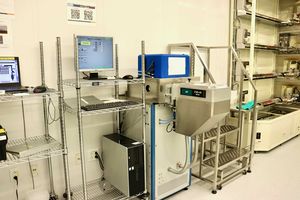Difference between revisions of "Oxford PlasmaLab 100 PECVD"
Jump to navigation
Jump to search
| Line 26: | Line 26: | ||
===== Allowed material in PECVD System ===== | ===== Allowed material in PECVD System ===== | ||
| − | * Si, Si<sub>x</sub>N<sub>y</sub>, SiO<sub>2</sub>, SOI | + | * Si, Si<sub>x</sub>N<sub>y</sub>, SiO<sub>2</sub>, SOI, SiC, GaN |
| + | * Al, Pt, Cr, W, Mo, Ti | ||
* Hard masks compatible with process temperature | * Hard masks compatible with process temperature | ||
| + | |||
| + | ==== List of materials NOT allowed in the chamber ==== | ||
| + | {| class="wikitable" | ||
| + | |- | ||
| + | ! Name || symbol || Melting Point [C] | ||
| + | |- | ||
| + | | Bismuth || Bi || 271 | ||
| + | |- | ||
| + | | Cadmium || Cd || 321 | ||
| + | |- | ||
| + | | Carbon || C || Subl. | ||
| + | |- | ||
| + | | Gallium || Ga || 30 | ||
| + | |- | ||
| + | | Gold || Au || 1062 | ||
| + | |- | ||
| + | | Indium || In || 157 | ||
| + | |- | ||
| + | | Lead || Pb || 328 | ||
| + | |- | ||
| + | | Lithium || Li || 179 | ||
| + | |- | ||
| + | | Selenium || Se || 217 | ||
| + | |- | ||
| + | | Sulfur || S || 115 | ||
| + | |- | ||
| + | | Tellurium || Te || 452 | ||
| + | |- | ||
| + | | Thallium || Tl || 302 | ||
| + | |- | ||
| + | | Tin || Sn || 232 | ||
| + | |- | ||
| + | | Zinc || Zn || 419 | ||
| + | |} | ||
| + | |||
== Resources == | == Resources == | ||
Revision as of 16:14, 31 October 2022
 |
|
| Tool Name | Oxford PlasmaLab 100 PECVD |
|---|---|
| Instrument Type | Deposition |
| Staff Manager | Sam Azadi |
| Lab Location | Bay 1 |
| Tool Manufacturer | Oxford |
| Tool Model | PlasmaLab 100 |
| NEMO Designation | {{{NEMO_Designation}}} |
| Lab Phone | 215-898-9736 |
| SOP Link | QNF SOP |
Description
The QNF Oxford Instruments PlasmaLab System 100 Plasma Enhanced Chemical Vapor Deposition (PECVD) tool is used to deposit a variety of thin-film materials at relatively modest temperatures on a variety of substrate materials. The tool utilizes an RF generator to deposit thin films at temperatures lower than traditional chemical vapor deposition systems. The tool operates between 150 and 350 C.
Applications
- Silicon dioxide deposition
- Silicon nitride deposition
- Amorphous silicon deposition
Allowed material in PECVD System
- Si, SixNy, SiO2, SOI, SiC, GaN
- Al, Pt, Cr, W, Mo, Ti
- Hard masks compatible with process temperature
List of materials NOT allowed in the chamber
| Name | symbol | Melting Point [C] |
|---|---|---|
| Bismuth | Bi | 271 |
| Cadmium | Cd | 321 |
| Carbon | C | Subl. |
| Gallium | Ga | 30 |
| Gold | Au | 1062 |
| Indium | In | 157 |
| Lead | Pb | 328 |
| Lithium | Li | 179 |
| Selenium | Se | 217 |
| Sulfur | S | 115 |
| Tellurium | Te | 452 |
| Thallium | Tl | 302 |
| Tin | Sn | 232 |
| Zinc | Zn | 419 |
Resources
SOPs & Troubleshooting
Protocols and Reports
- SiO2 deposition process parameters
- SiNx deposition process parameters
- Optimization of a-Si deposition on Oxford PlasmaLab 100 PECVD using Taguchi L9 based DOE
Most Recent Deposition Rates
- SiO2:
Recipe parameters: optimized process parameters are in the report above Recipe name on the tool: Test-SiO2 Deposition rate: ~ 286 nm/min ± 2 nm/min
- SiNx
Recipe parameters: optimized process parameters are in the report above Recipe name on the tool: Test-SiNx deposition Deposition rate: ~ 45 nm/min ± 2 nm/min
- a-Si
Recipe parameters: optimized process parameters are in the report above Recipe name on the tool: a-Si Deposition rate: ~ 56 nm/min ± 3 nm/min